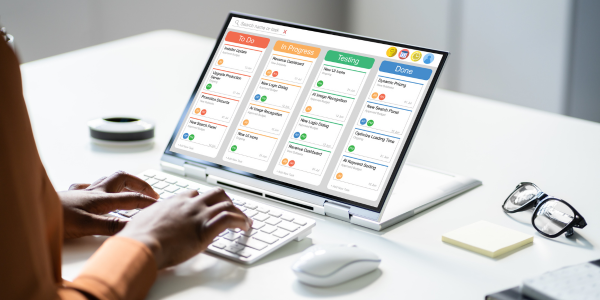Understanding the Different Property Manager Roles
Learn about our Pod Style Property Management Team
At Coastline Equity, we use a Pod Style Property Management Team. The roles and responsibilities differ greatly based on the position. If you are a potential tenant, property owner, or interested in property management, knowing these differences is important.
At Coastline Equity, we manage residential and commercial properties. Each role helps keep daily operations running smoothly and ensures we follow our policies, laws, and regulations.
In this blog post, we’ll break down the key differences between the Assistant Property Manager (APM), Property Manager (PM), and Senior Property Manager (Sr. PM) roles to clarify their distinct management tasks, responsibilities, and qualifications within the property management structure.
What is an Assistant Property Manager (APM)?
An Assistant Property Manager (APM) plays a crucial role in residential property management and commercial property management by supporting the Property Manager and Senior Property Manager in various aspects of property maintenance and tenant services. The APM assists in the day-to-day management of properties by overseeing tenant communication, handling vendor interactions, and conducting regular inspections.
However, a significant distinction in the APM’s role is that they are not responsible for direct client communication or strategic decision-making. Their tasks involve completing monthly reporting, coordinating move-ins and move-outs, and auditing work orders—all of which are reviewed and approved by the Senior Property Manager.
Key Responsibilities of an Assistant Property Manager:
- Assisting the Sr. PM with tenant and vendor communication.
- Managing property maintenance tasks and daily inspections.
- Supporting the PM with financial management reporting.
- Fielding emergency calls in collaboration with the Sr. PM.
What is a Property Manager (PM)?
A Property Manager (PM) takes on more comprehensive responsibilities, overseeing an entire portfolio of properties, typically between 150-200 units. Property managers are responsible for the financial, operational, and tenant-related aspects of the properties they manage. They ensure landlord-tenant laws are followed, collect rent, and handle tenant inquiries and disputes.
Unlike an APM, a PM is authorized to have direct lease renewal negotiations and handle tenant ledger issues. PMs must also ensure that properties comply with all applicable laws and regulations. They are involved in both residential and commercial real estate management, balancing a range of management tasks from property maintenance to financial management.
Key Responsibilities of a Property Manager:
- Managing tenant relationships and handling escalated issues.
- Overseeing financial management duties, including rent collection and expense approval.
- Conducting regular property inspections and ensuring compliance with landlord-tenant laws.
- Handling emergencies and maintaining the overall well-being of their assigned properties.
Qualifications: A Property Manager must have a Real Estate Salesperson License or Broker's License, as mandated by the California Department of Real Estate.
What is a Senior Property Manager (Sr. PM)?
A Senior Property Manager (Sr. PM) has the highest level of responsibility within the property management company.
This role manages the properties and the work of APMs and PMs. It ensures that all management tasks are done efficiently. The Sr. PM is responsible for reviewing inspections, move-outs, and financial management reports, client communication and management, and providing final approvals where needed.
A Senior Property Manager oversees the company's more complex portfolios. This includes commercial real estate and larger residential property management projects. They also have the final say in tenant communication disputes, property budgeting, and major property maintenance decisions.
Key Responsibilities of a Senior Property Manager:
- Supervising and guiding the work of APMs and PMs.
- Reviewing and approving major tenant interactions and financial reports.
- Conducting bi-monthly inspections and offering feedback on property maintenance.
- Handling escalated tenant disputes and overseeing legal compliance.
Qualifications: The Senior Property Manager role requires significant experience and the necessary licensure, ensuring they can manage large portfolios while adhering to landlord-tenant laws and laws and regulations relevant to property management companies.
The Role of On-Site Managers
In addition to APMs, PMs, and Sr. PMs, on-site managers are essential for the smooth running of individual properties. They handle the day-to-day operations at specific properties, such as maintaining cleanliness, assisting with move-ins and move-outs, and communicating with tenants and vendors.
Unlike PMs and Sr. PMs, they do not oversee large portfolios but are critical in maintaining the physical aspects of the property.
Key Differences Between APM, PM, and Sr. PM Roles at Coastline Equity
| Role | Portfolio Size | Client Communication | Approval Responsibility | License Requirement |
|---|---|---|---|---|
| Assistant Property Manager (APM) | Assists with smaller sections | No client communication | Requires Sr. PM approval for major decisions | No real estate license required |
| Property Manager (PM) | Full portfolio with less complex properties | Handles direct client communication | Approves financial reports up to a certain limit | Must have a real estate license |
| Senior Property Manager (Sr. PM) | Larger, complex portfolios | Oversees all communication | Final approval for all major decisions | Must have a broker’s license |
Qualifications and Career Growth at Coastline Equity
Coastline Equity offers clear paths for career growth in the property management industry. Starting as an Assistant Property Manager allows individuals to develop a solid foundation in day-to-day operations while assisting PMs and Sr. PMs. With additional experience and the necessary licensure, an APM can grow into a PM role, where they take on more financial management and direct tenant responsibilities. Those who excel as PMs may eventually become Sr. PMs, leading larger portfolios and overseeing a broader scope of operations, including both commercial real estate and residential property management.
FAQ Section
Q: Can an APM become a PM?
A: Yes, with the right experience and after obtaining the required Real Estate Salesperson License, an APM can be promoted to PM. However, this is not automatic and depends on performance and qualifications.
Q: What happens in tenant disputes?
A: PMs and APMs are responsible for handling tenant disputes. However, if the issue escalates, the Sr. PM will step in to provide guidance or final decisions.
Q: Who handles emergencies?
A: Both APMs and PMs are expected to field emergency calls, ensuring that tenants' urgent needs are addressed. The Sr. PM provides support in major emergencies.
Understanding the distinct roles within property management is key to ensuring smooth operations and effective management of residential and commercial properties. At Coastline Equity, each role—APM, PM, and Sr. PM—plays an integral part in ensuring the success of the properties we manage. Whether you are a property owner, tenant, or someone exploring a career in property management, knowing these roles and responsibilities helps in navigating the complex landscape of the property management industry.
Are you looking for expert property management services? Contact Coastline Equity today to discover how we can manage your properties with the highest level of care and professionalism.
More about Coastline Equity
Property Management Services
 Learn More
Learn MoreOur team will handle all your property needs, offering specialized services such as in-depth inspections, liability management, staff recruitment and training, and round-the-clock maintenance—expert support tailored to the unique requirements of your real estate assets.
About Us
 Learn More
Learn MoreOur dedicated team transforms property management challenges into opportunities. From tenant management to streamlined rent collection and proactive maintenance.
Property Management Excellence
 Learn More
Learn MoreAs a contributing author for Forbes, Anthony A. Luna brings a wealth of expertise and knowledge in the property management industry, real estate sector, and entrepreneurship, providing insights and thought-provoking analysis on a range of topics including property management, industry innovation, and leadership.
Anthony has established himself as a leading voice in the business community. Through his contributions to Forbes, Anthony is set to publish his first book, "Property Management Excellence" in April 2025 with Forbes Books.
Insights
 Learn More
Learn MoreLearn more about Coastline Equity's property management practices & processes and how we support our clients with education and a growth mindset.
Coastline Equity Property Management is your partner as you continue to learn and grow.
News & Updates
Property Management Made Easy
Los Angeles
1411 W. 190th St.,
Suite 225
Los Angeles, CA 90248
Temecula
41743 Enterprise Circle N.,
Suite 207
Temecula, CA 92590
P.O. BOX #1489
TORRANCE, CA 90505






